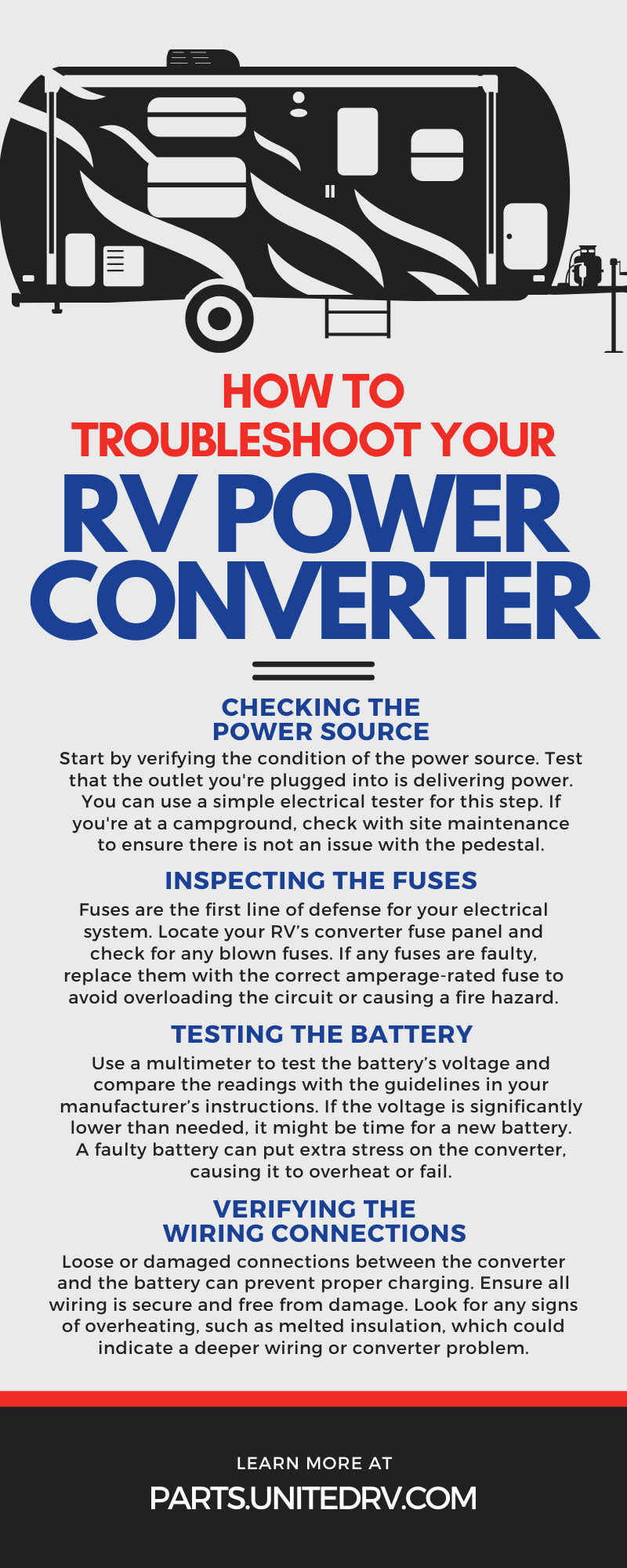How To Troubleshoot Your RV Power Converter

Owning an RV is more than a leisurely pursuit; it's a lifestyle offering the freedom to travel and set up camp in the most stunning backdrops nature can offer. But with this freedom comes the responsibility of maintaining the various systems your home-on-the-go relies on. Among these, the RV power converter plays a crucial role in ensuring your electrical systems are operating smoothly. In this guide to troubleshooting your RV power converter, we'll delve into common issues you might encounter and outline a step-by-step plan to get your system back on track.
Understanding the RV Power Converter
Before we jump into how to diagnose potential problems, let’s take a moment to understand what a power converter is and why it’s so important. In simple terms, an RV power converter takes 120-volt AC power from shore power and converts it to 12-volt DC power. This allows you to charge your house batteries and run your lights, water pump, furnace, and any other 12-volt systems in your camper.
Most modern RVs come with a power converter that includes a built-in battery charger. This device is the bridge between your generator or campground hook-up and all the creature comforts you enjoy inside your RV. Understanding this device's essential role will help you recognize when something's not quite right with your electrical system.
Common Issues With RV Power Converters
Several issues can develop with power converters, resulting in headaches for RV owners. Understanding the symptoms of these problems can help narrow down the root cause of your electrical woes. Here are a few top issues to know about.
- Overheating and damage: If you notice a burning smell, the converter is hot to the touch, or you’ve experienced a blown fuse, it could indicate that your converter is overheating.
- Battery not charging: A common issue is the converter failing to charge the battery, which can stem from a faulty circuit, wiring issues, or a failed converter unit.
- Electric system fluctuations: Fluctuations in the camper's electrical system, such as lights dimming and brightening, can be signs of a converter problem or a failing battery.
- No power to 12-volt systems: If you're not getting power to your 12-volt systems when plugged into shore power, the converter might not be functioning correctly.
By recognizing these signs early, you can take action to prevent more severe issues and keep your RV running smoothly.
Troubleshooting Steps for RV Power Converters
Now that you know some of what to look out for, it’s time to discuss the specifics about how to troubleshoot your RV power converter. Engaging in a systematic troubleshooting process can identify the cause of the issue and guide you toward a solution. However, for the best results, always refer to your RV power converter’s owner’s manual first for troubleshooting and repair instructions. This resource will include more specific steps that you should take to correct common issues with a particular converter model.
Following this, there are additional steps in diagnosing your RV power converter to know, such as:
1. Checking the Power Source
Start by verifying the condition of the power source. Test that the outlet you're plugged into is delivering power. You can use a simple electrical tester for this step. If you're at a campground, check with site maintenance to ensure there is not an issue with the pedestal.
If you’re not getting power, you may need to reset the breaker or replace the outlet. It's also possible that the problem lies with your shore power cord; take the time to inspect it for frayed wires or other damage.
2. Inspecting the Fuses
Fuses are the first line of defense for your electrical system. Locate your RV’s converter fuse panel and check for any blown fuses. If any fuses are faulty, replace them with the correct amperage-rated fuse to avoid overloading the circuit or causing a fire hazard.
3. Testing the Battery
If your battery isn’t charging, it’s time to investigate further. Begin by checking the battery connections for rust or corrosion. Clean these terminals and inspect the battery for any physical damage.
Use a multimeter to test the battery’s voltage and compare the readings with the guidelines in your manufacturer’s instructions. If the voltage is significantly lower than needed, it might be time for a new battery. A faulty battery can put extra stress on the converter, causing it to overheat or fail.
4. Verifying the Wiring Connections
Loose or damaged connections between the converter and the battery can prevent proper charging. Ensure all wiring is secure and free from damage. Look for any signs of overheating, such as melted insulation, which could indicate a deeper wiring or converter problem.
5. Assessing the Converter Unit
If all else fails, it’s time to inspect the converter unit itself. Turn off all power to the RV, then visually inspect the converter for signs of damage, such as scorch marks or melted components.
Next, perform a test on the converter to check its functioning. With the RV unplugged and the battery disconnected, use the multimeter to test the terminals where the battery would connect. You should see a reading of about 13.6–14.4 volts if the converter is working properly. If not, it may be time to replace the unit.
Preventive Maintenance Tips
An RV power converter can be one of the most overlooked components of your camper’s electrical system. Regular maintenance not only prevents issues but also extends the life of the converter. Refer to your owner’s manual for detailed maintenance guidelines. Some general tips to keep your own converter in top shape include the following notes.
Keep Connections Clean
Corrosion is a common issue with electrical systems. Check the battery connections and the converter unit's terminals regularly, and clean them as needed to ensure a solid electrical connection.
Monitor Battery Health
Your battery's condition directly affects the performance of the converter. Test your battery regularly to ensure it's holding a charge, and replace it as necessary.
Check for Wiring Wear
Over time, the wires that connect the converter to the battery and other electrical components can become damaged. If you notice any wear or fraying, you should replace them immediately to avoid a potential short circuit.
Maintain a Cool Environment
High temperatures can stress the converter and cause internal components to fail. Ensure the converter has good ventilation, and always park your RV in the shade when possible.
Update the Converter
If you have an older RV model, consider upgrading to a newer, more efficient power converter. Newer models offer better charging capabilities and may come with built-in surge protectors and other safety features.
Investing time in preventive maintenance is not only a wise decision but also an essential part of being a responsible RV owner, ensuring you'll enjoy your travels without being sidelined by an unnecessarily complicated issue.
The power converter is the unsung hero of your RV's electrical system. By understanding how your power converter works and following systematic troubleshooting steps, you'll be well-equipped to handle common power conversion issues. Even if you need to replace these devices, you can find a new one with little trouble by shopping at United RV Center. Our series of premium RV power converters has something for every make or model of RV, allowing you to select the perfect match for your needs with ease.

